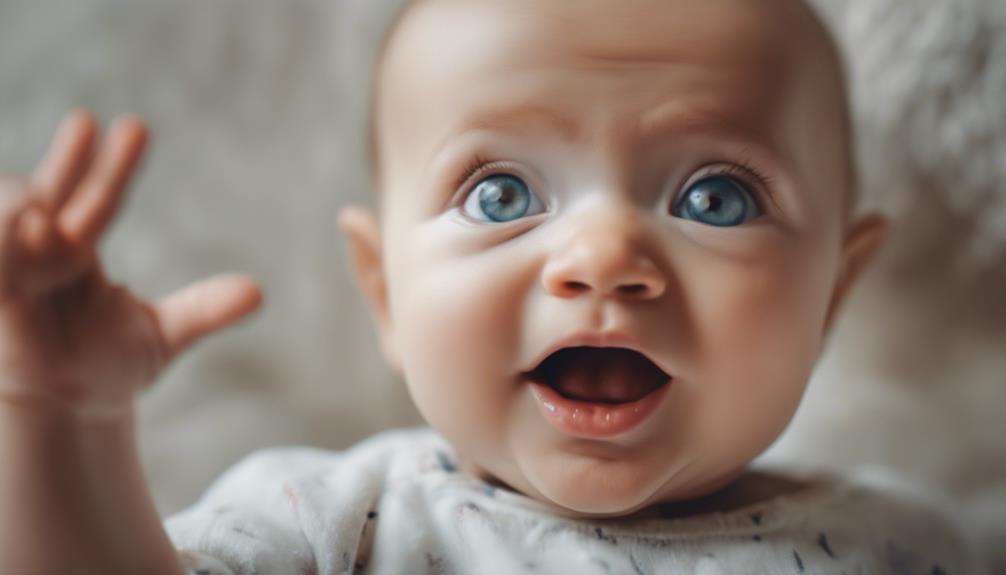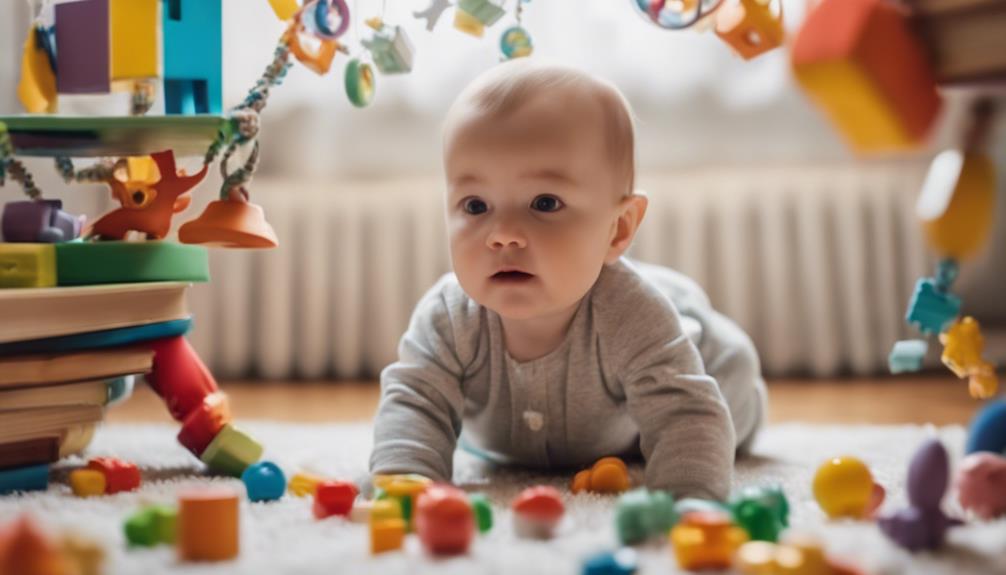When searching for signs of a genius baby, watch out for exceptional alertness, advanced motor skills, early language abilities, remarkable memory retention, rapid learning speed, outstanding problem-solving skills, and a knack for creativity and imagination. These characteristics may indicate cognitive development and potential intelligence. Engaging in activities that promote these areas can boost their growth and abilities. By fueling their curiosity, offering age-appropriate challenges, and fostering their talents, you can aid their intellectual development. Being mindful of these signs can offer insight into your baby’s unique abilities and potential.
Key Takeaways
- High alertness, quick recognition, and bonding with family indicate intelligence.
- Advanced motor skills like early sitting up reveal cognitive abilities.
- Early and extensive language skills showcase cognitive development.
- Exceptional memory retention with early name/event recollection is promising.
- Rapid learning speed, curiosity, and enthusiasm for learning are signs of a genius baby.
Alertness
Alert babies demonstrate early signs of intelligence through their high alertness. This trait is evident in their quick recognition and bonding with family members. This important state of awareness plays a vital role in their cognitive and emotional development.
To support these babies, providing a calm environment for sleep is essential. Techniques such as white noise and a consistent bedtime routine can help soothe alert babies, promoting better sleep quality.
Recognizing and responding to their alertness not only aids in creating a secure attachment but also fosters their overall development. By acknowledging and engaging with their alertness, caregivers can greatly contribute to the baby's ability to process and interact with the world around them.
This early display of alertness not only indicates intelligence but also sets a strong foundation for future learning and social interactions.
Motor Skills
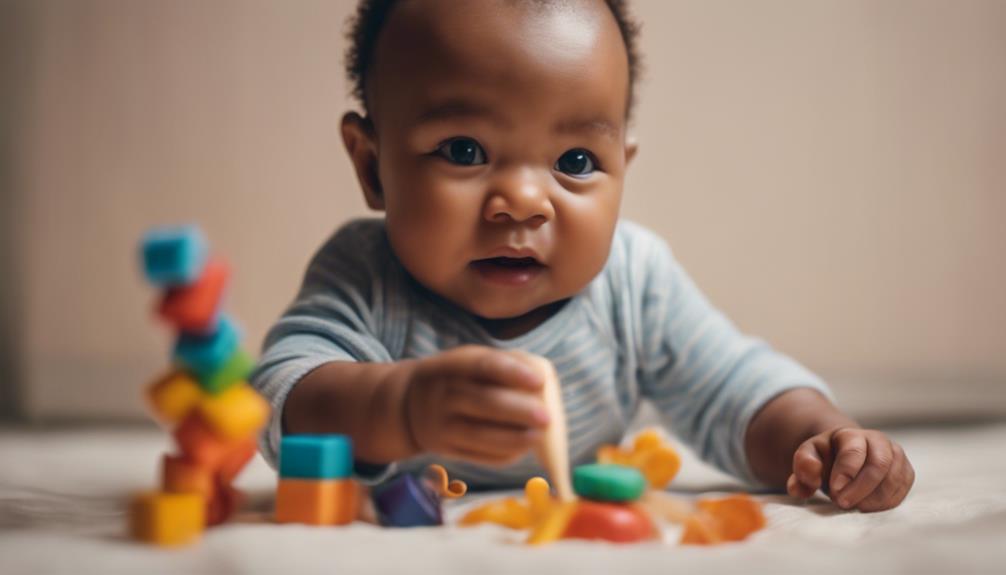
Developing motor skills in babies can provide valuable insights into their cognitive abilities and potential for intelligence. Advanced motor skills like sitting up early or grasping objects with precision may indicate giftedness in babies.
Exceptional hand-eye coordination or early walking can be signs of a baby's intelligence. Fine motor skills, such as stacking blocks or manipulating toys, can demonstrate high cognitive abilities in infants.
Gifted babies may exhibit advanced gross motor skills like crawling, walking, or climbing earlier than their peers, showcasing their physical prowess and coordination. Observing a baby's coordination, balance, and overall physical abilities can offer glimpses into their intellectual potential.
Language Abilities
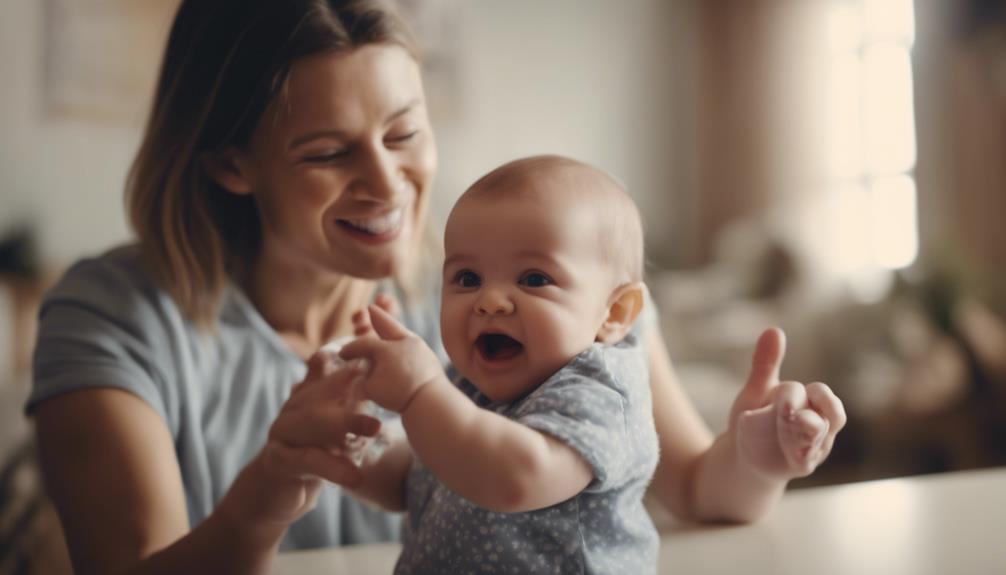
Observing a baby's coordination, balance, and overall physical abilities can offer glimpses into their intellectual potential, and similarly, a baby's language abilities can provide valuable insights into their cognitive development and potential for intelligence.
Gifted babies often display early and extensive language skills, speaking in clear sentences at a young age. Their advanced language development may manifest in asking complex questions that push the boundaries of adult comprehension. Stimulating language development through activities like reading can greatly contribute to intellectual growth, enhancing vocabulary and fostering creativity.
Exceptional language abilities in babies may also be evident through their memory retention of words and concepts. Encouraging curiosity and actively answering the questions posed by these young minds can further stimulate their intellectual growth.
Memory
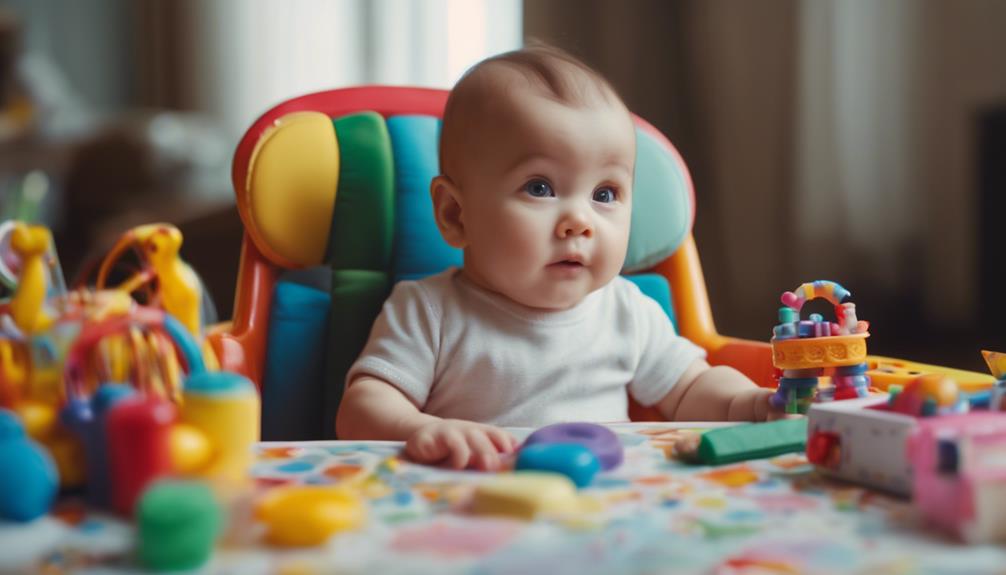
Gifted babies often exhibit exceptional memory retention, recalling details from a young age.
Early signs of a genius baby may include remembering names, faces, or events with clarity.
Babies showing advanced memory skills may recall experiences or routines with precision.
Memory Milestones
An exceptional memory in babies can serve as a promising indication of intelligence. Recognizing memory milestones in infants is important in understanding their cognitive abilities. Here are three key memory milestones to look for in babies:
- Early Recognition of Patterns: Babies with strong memory skills often exhibit early recognition of patterns. Whether it's identifying familiar objects or anticipating sequences, this ability showcases advanced memory development.
- Remembering Names and Faces: The capacity to remember names and faces at a young age is a positive indicator of exceptional memory. Babies who can recall information like names of family members or faces of familiar individuals demonstrate impressive memory retention.
- Recalling Information: Celebrating a baby's ability to recall information is vital for nurturing their memory skills. Encouraging memory development through activities like memory matching games can aid in reinforcing their memory capabilities. By nurturing these skills, you can help enhance their intelligence and memory retention from a young age.
Recall Abilities
Developing strong recall abilities in babies is essential for nurturing their memory skills and cognitive development. Gifted babies often display exceptional memory skills, effortlessly recalling details and events with surprising accuracy. From a young age, they may easily remember faces, names, and complex information, showcasing advanced memory abilities. These babies demonstrate an ability to recall sequences, patterns, and past experiences, indicating strong memory skills.
Signs of early memory retention in gifted babies can be observed when they effortlessly recall songs, stories, or events from weeks or even months ago. Their capacity to process and retain information quickly sets them apart in cognitive development, as strong memory skills are closely linked to their cognitive abilities.
Witnessing a baby with exceptional memory skills recall information with precision can be a fascinating indication of their cognitive potential and early development in memory abilities.
Cognitive Development
To enhance a baby's cognitive development, focusing on their memory skills is crucial. Gifted infants may exhibit exceptional memory skills, surpassing their peers in retaining and recalling information with remarkable clarity.
Early signs of a genius baby's cognitive abilities often manifest through their advanced memory, where they can effortlessly recall events, words, or experiences. These exceptional memory skills allow gifted babies to recognize patterns, faces, or specific details at a young age, showcasing their cognitive prowess.
By nurturing memory development in genius babies through engaging activities that challenge their recall abilities, parents and caregivers can further enhance their cognitive abilities.
Observing a baby's memory retention and recall abilities can provide valuable insights into their cognitive development and potential as they grow and learn. Supporting and stimulating a baby's memory skills from an early age can lay a strong foundation for their cognitive growth and academic success in the future.
Curiosity & Learning Speed
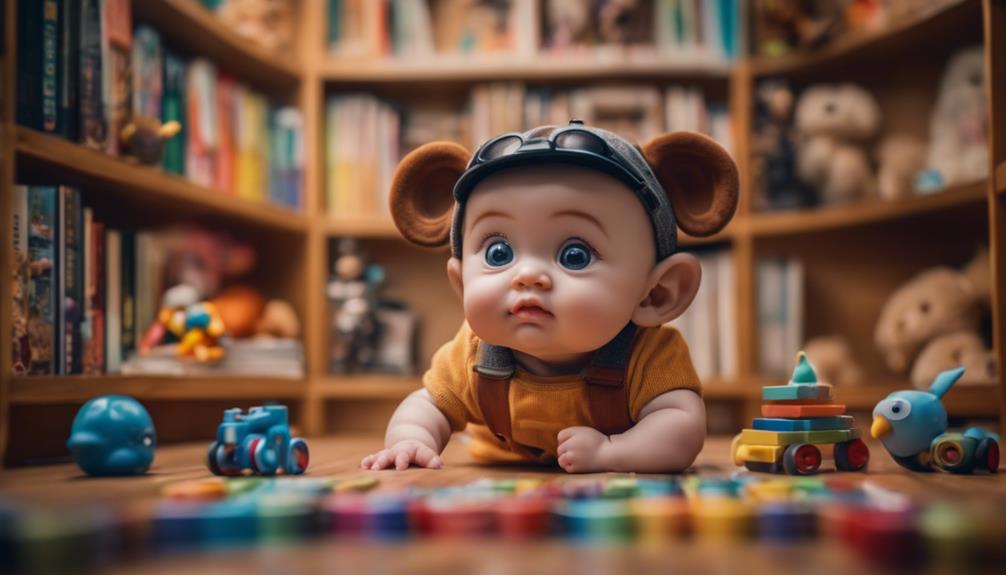
Highly intelligent babies often display a rapid learning speed, absorbing new information with ease and showing a remarkable ability to understand complex concepts. Their inquisitiveness serves as a strong indicator of their cognitive abilities, as they ask probing questions that challenge even adults.
Encouraging this inquisitiveness through educational resources can further enhance their enthusiasm to learn and explore the world around them.
Rapid Learning Abilities
With their intense curiosity and rapid learning speed, highly intelligent babies display exceptional abilities in grasping new information and skills. Their enthusiasm to explore and voracious appetite for learning set them apart from their peers. Here are three key traits that highlight their rapid learning abilities:
- Faster Learning Speed: Gifted babies show an accelerated pace in acquiring knowledge, absorbing information at a rate that surpasses typical developmental patterns. This swift learning speed allows them to quickly pick up new concepts and skills.
- Swift Retention of Knowledge: Exceptional learners not only learn quickly but also retain information effectively. Their ability to remember and apply what they've learned distinguishes them as advanced learners from a young age.
- Diverse Subjects Interest: Observing a baby's keen interest in various subjects can indicate their quick assimilation of information. Gifted babies often exhibit a broad curiosity, showing enthusiasm for learning across different fields of knowledge.
Inquisitiveness as Indicator
Intelligent babies who display rapid learning abilities often showcase their inquisitiveness as a strong indicator of their curiosity and speed in acquiring new knowledge. Highly intelligent infants exhibit a deep sense of curiosity, constantly exploring and seeking answers to their questions. Their keen interest in understanding the world around them drives them to grasp concepts quickly and become enthusiastic learners from an early age. These babies may surprise adults with their complex inquiries, demonstrating a natural inclination towards intellectual growth. Encouraging and supporting their inquisitiveness can play a crucial role in nurturing their potential for learning and development.
| Indicator | Description | Importance |
|---|---|---|
| Inquisitiveness | Constantly seeking new information | High |
| Rapid Learning | Grasping concepts quickly | High |
| Curiosity | Deep desire to understand environment | High |
| Enthusiastic Learners | Actively seeking out knowledge | High |
| Intellectual Growth | Nurturing potential for learning | High |
Problem-Solving
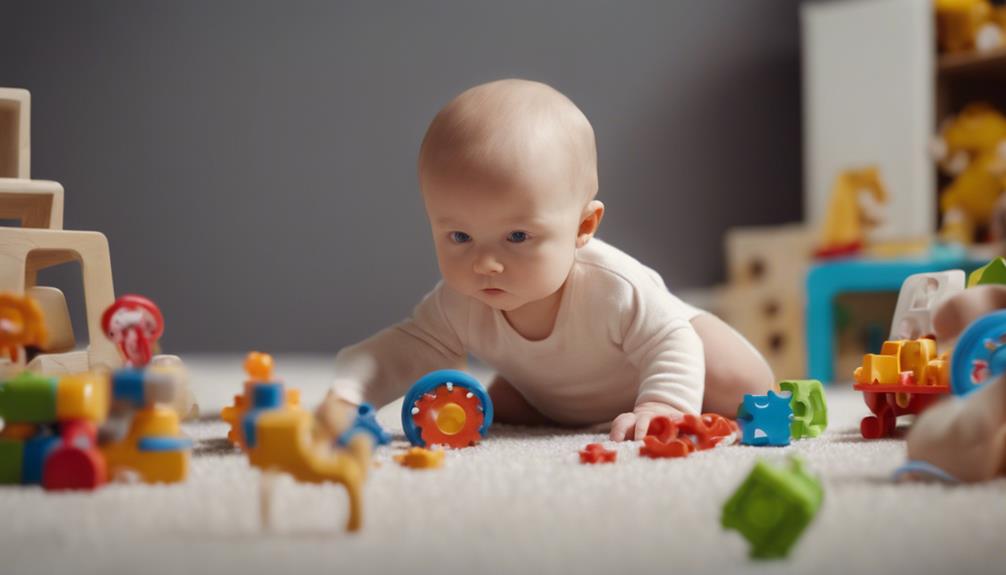
Encouraging challenges such as mini-mazes can effectively enhance your baby's problem-solving skills from a young age. Here are three key points to take into account:
- Intelligent babies often showcase exceptional problem-solving skills, displaying advanced cognitive abilities that set them apart. Nurturing these talents through interactive tasks like mini-mazes can further bolster their problem-solving abilities.
- Providing support and encouragement during problem-solving tasks is crucial for your baby's cognitive development. Cheering them on as they navigate through challenges not only boosts their confidence but also fosters a positive attitude towards problem-solving.
- Setting up age-appropriate challenges for your baby can help them hone their natural problem-solving skills. Early demonstrations of these abilities may hint at potential giftedness and signify a propensity for advanced cognitive development. By engaging your baby in stimulating activities that require problem-solving, you can lay a solid foundation for their intellectual growth.
Creativity & Imagination
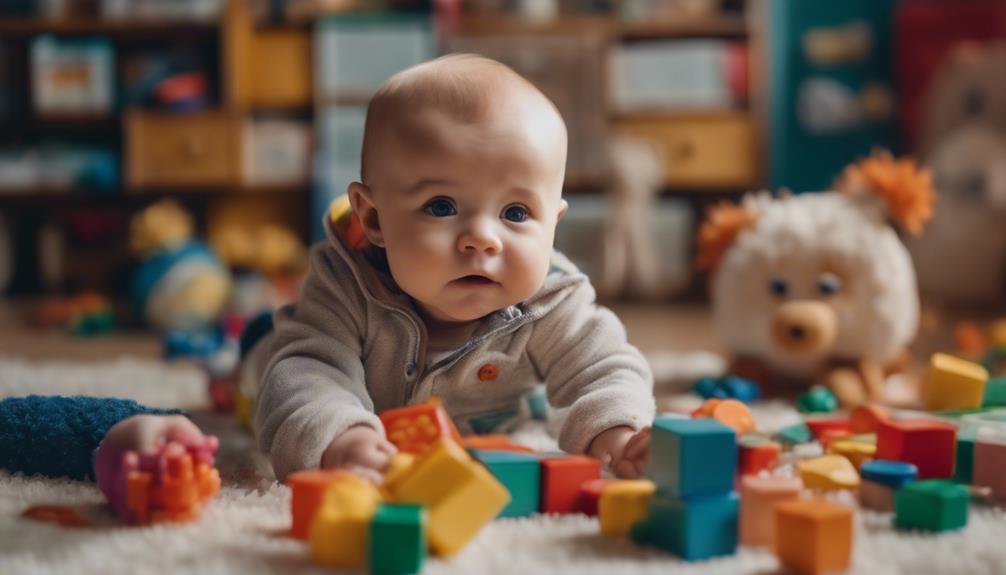
To nurture your baby's creativity and imagination, explore engaging activities that stimulate their inventive minds and encourage expressive play. Gifted babies often display exceptional creativity, generating elaborate ideas and engaging in imaginative play that showcases their advanced cognitive abilities. Signs of creativity in babies may include creating intricate imaginary worlds during playtime or expressing themselves through art and storytelling. Highly imaginative babies may immerse themselves in complex pretend play scenarios, demonstrating their vivid imaginations.
Encouraging activities such as drawing, storytelling, and imaginative play can further nurture your baby's natural creativity. By providing a stimulating environment that fosters creativity, you can help gifted babies thrive and express their imaginative talents.
| Signs of Creativity in Babies | Description | Examples |
|---|---|---|
| Intricate imaginary worlds during playtime | Babies create detailed fantasy settings during play | Building a pretend castle out of blocks |
| Expressing creativity through art and storytelling | Babies use art or words to express imaginative ideas | Drawing colorful pictures or telling imaginative stories |
| Engaging in complex pretend play scenarios | Babies immerse themselves in elaborate pretend play scenes | Pretending to be a superhero or acting out a tea party with stuffed animals |
Frequently Asked Questions
How to Identify a High IQ Baby?
To spot a baby with a high IQ, watch for early milestones like sitting solo or clear sentences. Look for intense focus, problem-solving skills, and a love for being alone. Curiosity, quick learning, and asking advanced questions are key signs.
How to Tell if an Infant Is a Genius?
To tell if an infant is a genius, observe for advanced problem-solving skills, exceptional alertness, early language development, high curiosity, excellent memory retention, and advanced motor skills. These traits may indicate a potentially gifted baby.
How Early Do Genius Babies Talk?
Genius babies may start talking as early as 10 months old, forming clear sentences ahead of their peers. Early speech development is a sign of high intelligence. Encourage and praise them for their efforts.
How to Check Baby IQ Level?
To check your baby's IQ level, observe their milestones, focus, problem-solving skills, and curiosity. Notice their alertness, social interactions, and memory retention. Seek guidance from pediatricians or child psychologists for a better understanding of your baby's potential intelligence.
Conclusion
To sum up, recognizing the signs of genius in a baby can be a challenging yet rewarding experience. By observing their alertness, motor skills, language abilities, memory, curiosity, problem-solving skills, and creativity, you can gain insight into their potential.
Just like a budding flower in a garden, these early indicators can help nurture and cultivate the brilliance that lies within. Keep a watchful eye and marvel at the possibilities that await.

